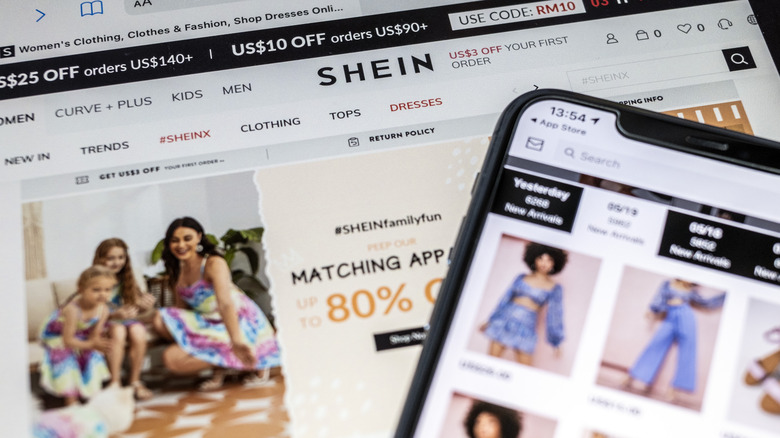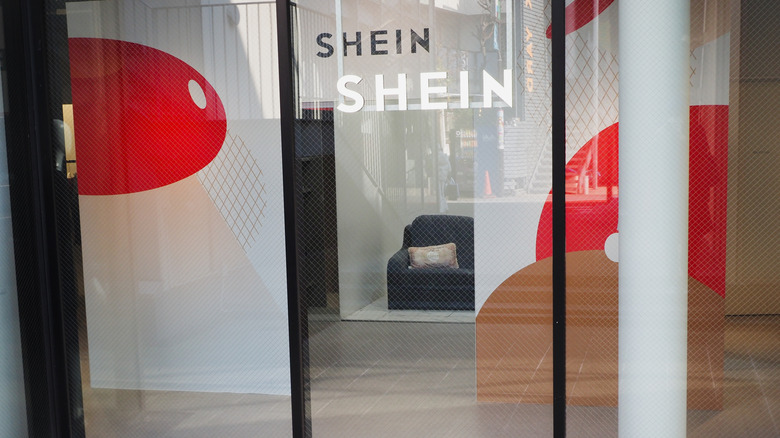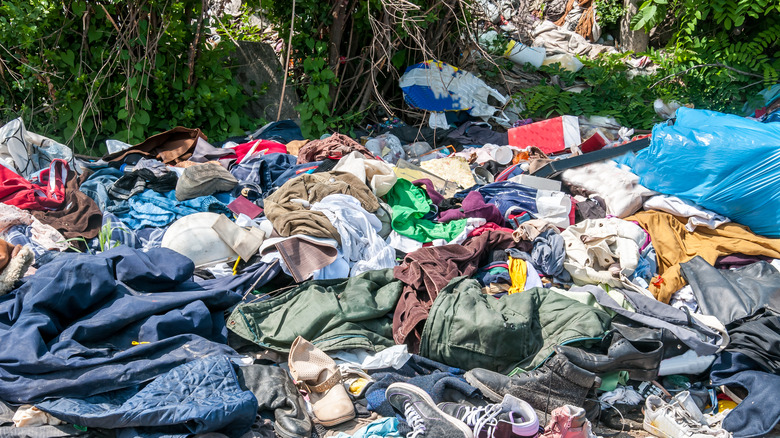Why SHEIN's Prices Are So Cheap, And Why You Shouldn't Fall For It
In the span of a few years, SHEIN has become the most popular fast fashion brand in the U.S. The company is known for its vast catalog of trendy clothing styles on its app and website at ridiculously affordable prices. It's not uncommon to find dresses, crop tops, and skirts on sale for under $3.
SHEIN is similar to online marketplaces like TEMU (which has its own shady side), Wish, and Alibaba, which have a massive collection of products at dirt-cheap prices. The company offers free standard shipping on orders above $9.90, and free express shipping on orders above $139. As a result, it makes sense for buyers to order multiple items of clothing to take advantage of free shipping.
SHEIN is valued at around $66 billion, which is more than the combined value of clothing giants like H&M and Zara combined. Unlike other brands, the Chinese company doesn't rely on physical retail stores. As a result, clothing purchased from SHEIN is shipped directly from its distribution centers to the U.S. and other countries around the world. SHEIN's cheap prices might be irresistible for shoppers on a budget, but they come at a heavy price paid by factory workers and the environment — and despite years of substantial controversy, issues remain.
Why SHEIN is so cheap
A significant reason behind SHEIN's cheap prices is the fact that the company is almost entirely dependent on online sales. According to an investigation by Wired, SHEIN works primarily with independent designers and producers, placing an initial order of 100 to 200 pieces for an item. The company uses sophisticated software that identifies popular items and automatically reorders them while stopping the production of pieces that don't sell. Even with this conservative practice, SHEIN adds up to 6,000 new styles to its website daily.
It takes under two weeks for clothing to be produced, but this fast turnaround time comes at the expense of poor working conditions. A 2022 documentary by the UK's Channel 4 called "Inside the Shein Machine: UNTOLD" details horrific working conditions, with factory workers subjected to 18-hour work days and only one day off per month. In addition, it alleged that workers were paid approximately $550 per month to make at least 500 pieces of clothing per day. By cutting labor costs, SHEIN is able to price its products more competitively than other fashion brands that comply with labor regulations.
Another way SHEIN saves money is by relying on influencer marketing, which is cheaper and often more effective than traditional marketing. Influencers post their SHEIN hauls on platforms like Instagram and TikTok, directing people to sales and offering discount coupons. In return, SHEIN pays them a fee for making these videos, as well as a commission on sales.
Investigators claim SHEIN's supply chain hasn't improved much
In May 2024, the organization Public Eye conducted an investigation into SHEIN, one that followed a similar investigation back in 2021. In its follow-up report, the group claimed that SHEIN's supply chain continues to revolve around harsh working conditions despite the company's attempts to improve its image over the past few years. As such, it's no surprise that SHEIN is one of multiple platforms consumers are abandoning.
The investigators, who interviewed more than a dozen workers in China, claim that many employees within the SHEIN supply chain are working 12-hour days for typically seven days per week — similar conditions to the ones reported in the UK documentary in 2022. Despite the additional years of supposed efforts to improve conditions within SHEIN's supply chain, workers at some suppliers indicated that not much had changed.
Some employees said in the follow-up interviews that they're only able to take a single day off per month and that they cannot afford to work fewer hours due to the low pay. Workers speaking in 2024 reported wages spanning from the equivalent of around $829 USD to $1,380 USD, depending on factors like seasonal demand and skill level, despite the extreme overtime.
SHEIN's cheap prices come at a great cost
The environmental impact of fast fashion is well documented, with mountains of discarded clothes ending up in landfills. SHEIN's cheap prices and $7.99 shipping fee for returns result in many buyers not bothering to return ill-fitting or poor-quality pieces. As a result, many of these clothes are discarded, destined for landfills. While you might end up with some good pieces, getting badly stitched or poor-quality items from SHEIN is not uncommon. Even if you get a piece of clothing that fits well, it might not last more than a few washes.
The materials used in SHEIN's clothing are another concern. In July 2021, the U.S. Consumer Product Safety Commission recalled children's sleepwear sets that failed to meet flammability standards. Later that year, Health Canada recalled a children's jacket that was found to contain unsafe levels of lead.
Wired also mentions that SHEIN has also come under fire for blatantly ripping off designs from small designers. Designers have sued the company for stealing exact copies of their work and selling them on its website. The designers claim that SHEIN uses a complex algorithm to identify and duplicate emerging trends, and then puts the blame on third-party vendors it outsources production to.
While SHEIN's clothing is cheap and accessible, what you pay for is pretty much what you get. If you're concerned about fashion's environmental and ethical impact, you might want to consider buying from brands that comply with regulations and offer longer-lasting products.
It's accused of benefiting from forced Uyghur labor
SHEIN has been accused of benefitting from forced labor in China, with the rights group Stop Uyghur Genocide claiming that some of the cotton yarn found within the company's supply chain originates from a region in China linked to Uyghur internment camps. The matter led to a reportedly heated exchange between one of SHEIN's lawyers and members of the British parliament (MPs), who questioned the company's representative about the accusations.
The Guardian reported in January 2025 that SHEIN's lawyer, Yinan Zhu, was accused of "willful ignorance" by British MPs over failure to give a concrete answer about whether such cotton was used by any companies that produce clothing sold by SHEIN. Zhu claimed to be unqualified to answer questions about SHEIN's supply chain, and British MPs in turn accused the company of failing to provide evidence backing up its claims.
That includes Zhu's statement that SHEIN audits its suppliers and ends contracts with ones it finds to be using child and/or forced labor. "For a company seeking to float on the London Stock Exchange, the committee has been pretty horrified by the lack of evidence," committee chair Liam Byrne had said at the time. This matter itself follow a report from SHEIN in 2024 in which it claimed it found and resolved two instances of child labor within its supply chain.




